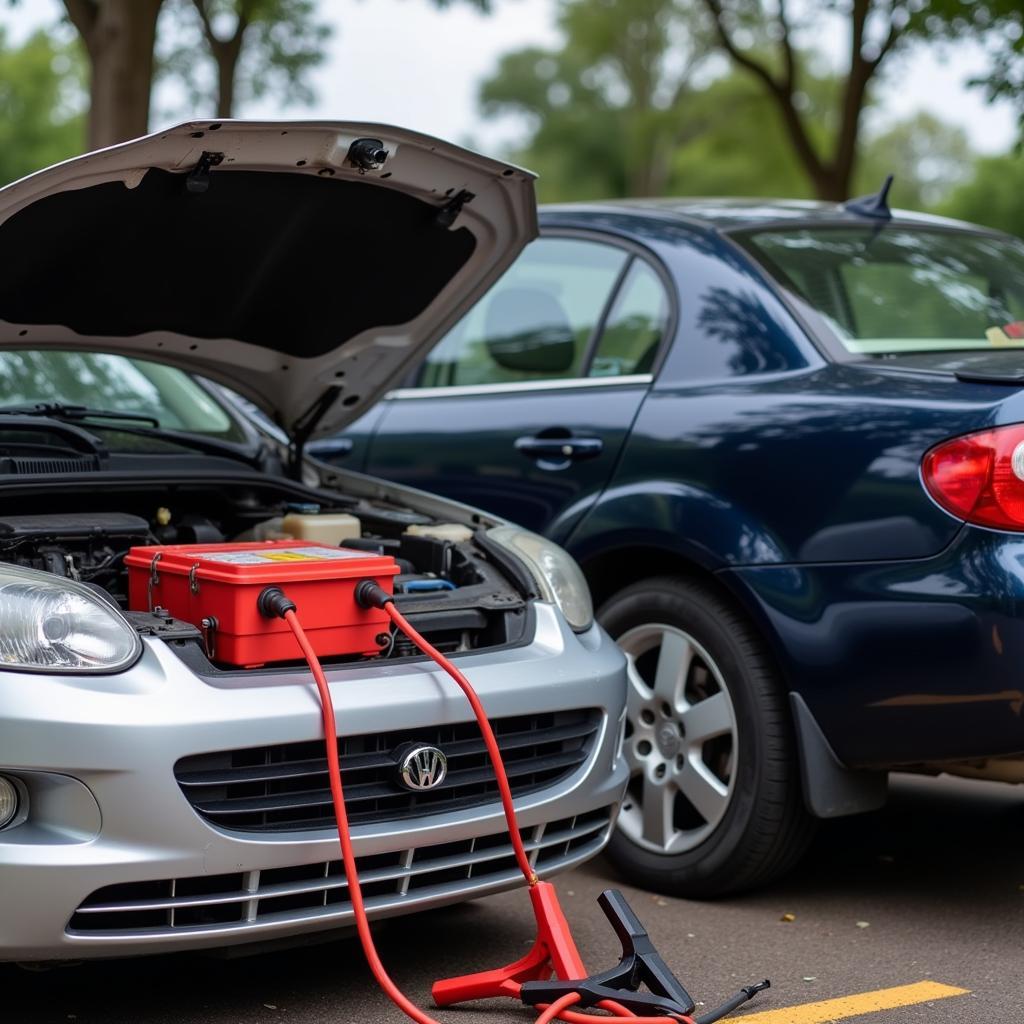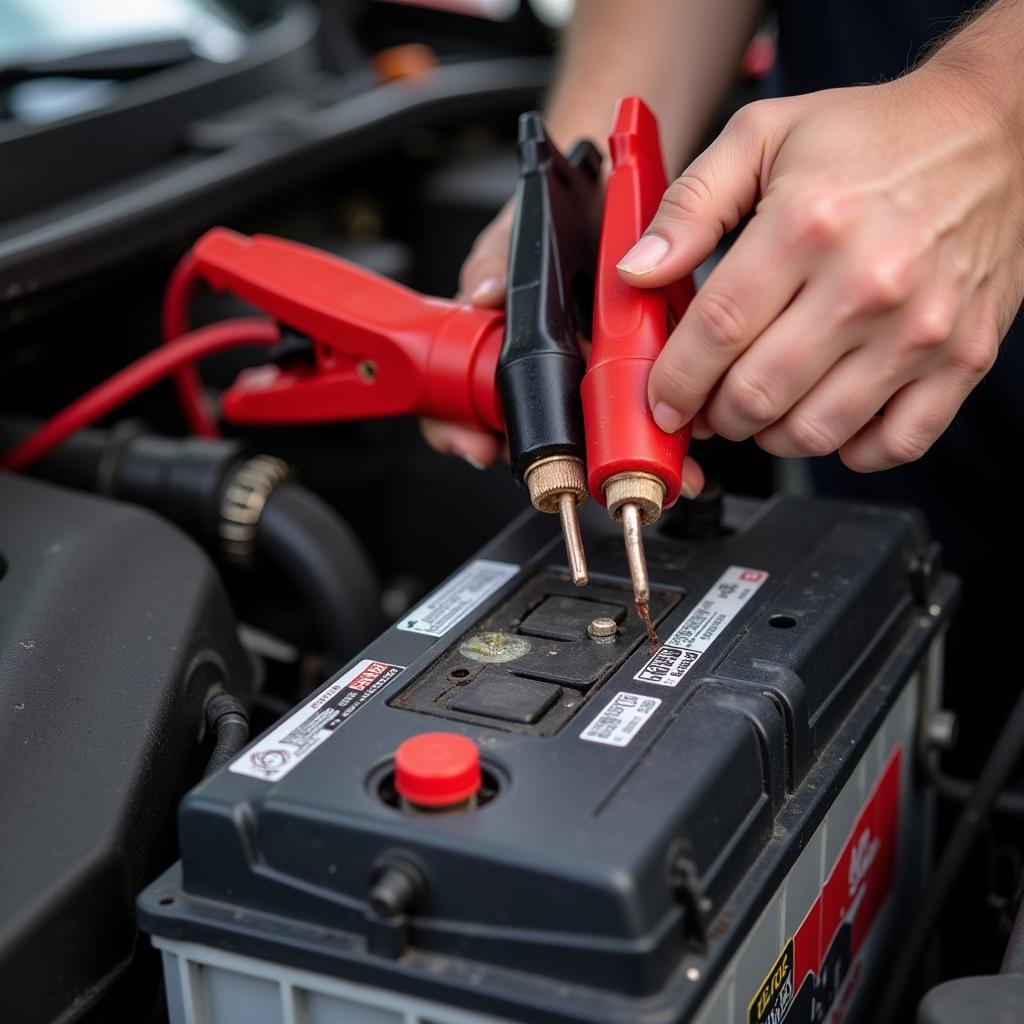If your car not starting after boost, you’re not alone. This frustrating situation can leave you stranded and searching for answers. This comprehensive guide will walk you through the common causes and provide effective solutions to get your car running again. We’ll cover everything from checking your battery connections to diagnosing more complex electrical issues. Let’s get started!
 Car Battery Jump Start Failure
Car Battery Jump Start Failure
Common Reasons Your Car Won’t Start After a Boost
Several factors can contribute to your car not starting after a boost. Here are some of the most common culprits:
- Weak or Dead Battery: Even after a boost, a severely depleted battery might not hold enough charge to start the engine. If you find yourself in this situation, check out our article on reasons your car battery dies.
- Poor Battery Connections: Corroded or loose battery terminals can prevent the jump start from effectively transferring power.
- Faulty Alternator: A malfunctioning alternator won’t recharge the battery, even after a jump.
- Starter Motor Issues: A failing starter motor won’t crank the engine, regardless of how much power the battery has.
- Blown Fuses: A blown fuse in the starting circuit can interrupt the flow of electricity.
- Ignition System Problems: Issues within the ignition system, like a bad ignition switch or coil, can prevent the engine from starting.
- Fuel System Issues: While less common after a boost, problems with the fuel pump or fuel filter can prevent the engine from receiving fuel.
“A common mistake people make is assuming the battery is the only problem,” explains automotive electrical expert, John Smith, ASE Certified Master Technician. “Often, a failed jump start points to a bigger issue like a bad alternator or starter.”
 Checking Battery Connections After Jump Start
Checking Battery Connections After Jump Start
Troubleshooting a Car That Won’t Start After Boosting
Follow these steps to diagnose the problem:
- Check Battery Connections: Ensure the battery terminals are clean, tight, and free of corrosion.
- Inspect the Cables: Make sure the jumper cables are in good condition and connected correctly. More details can be found in our article on jump starting car not working.
- Test the Battery Voltage: Use a multimeter to check the battery voltage. A reading below 12.4 volts indicates a weak battery.
- Check the Alternator: With the engine running (if possible), check the voltage across the battery terminals. A reading between 13.5 and 14.5 volts indicates a healthy alternator.
- Inspect the Starter: Listen for a clicking sound when you turn the key. This could indicate a faulty starter motor. If your car won’t start even with jumper cables, you can find more information in our article on car wont start with jumper cables.
“Don’t overlook the simple things,” advises Sarah Jones, Lead Electrical Systems Engineer at AutoTech Solutions. “A corroded terminal or loose cable can be the difference between a quick fix and a costly repair.”
Advanced Diagnostics and Solutions
If the basic troubleshooting steps don’t resolve the issue, you might need more advanced diagnostics. This may involve:
- Checking for Error Codes: Using an OBD-II scanner can reveal diagnostic trouble codes that pinpoint the source of the problem.
- Testing the Ignition System: This may involve checking the ignition switch, coil, and spark plugs.
- Inspecting the Fuel System: Checking the fuel pump, filter, and injectors.
For situations where the jump start isn’t working, our article on car battery dead jump start not working offers additional insights. If you’re working with electronics in your car, you might find our guide on connect bluetooth mic to car radio helpful.
Conclusion
A car not starting after boost can be a sign of several underlying issues. By following the steps outlined in this guide, you can identify the problem and take the necessary action. Remember to check the battery connections, test the battery and alternator, and inspect the starter. If the problem persists, consider seeking professional help for advanced diagnostics and repair.
FAQ
- Why is my car not starting even after a jump start? Several reasons, including a dead battery, faulty alternator, bad starter, or blown fuses.
- How do I know if my alternator is bad? Test the voltage across the battery terminals while the engine is running. A reading outside of 13.5-14.5 volts may indicate a bad alternator.
- Can a bad starter prevent my car from starting after a boost? Yes, a faulty starter won’t crank the engine, even with a fully charged battery.
- What should I do if my car still won’t start after checking everything? Consult a qualified mechanic for further diagnostics.
- How can I prevent my car battery from dying? Regular maintenance, ensuring all electrical components are turned off when not in use, and addressing any underlying electrical issues.
- Is it safe to jump-start a car? Yes, if done correctly, but always follow safety precautions.
- How long should I let my car run after a jump start? At least 30 minutes to allow the alternator to recharge the battery.
